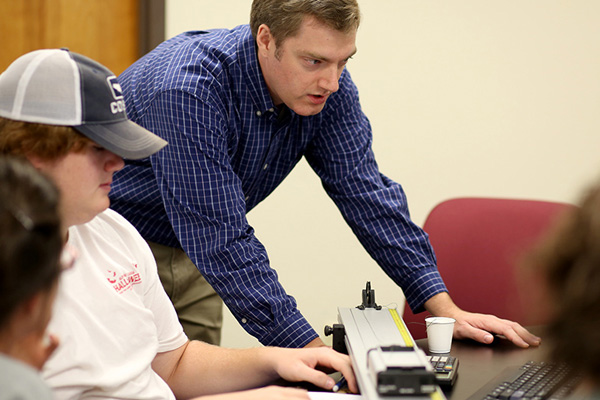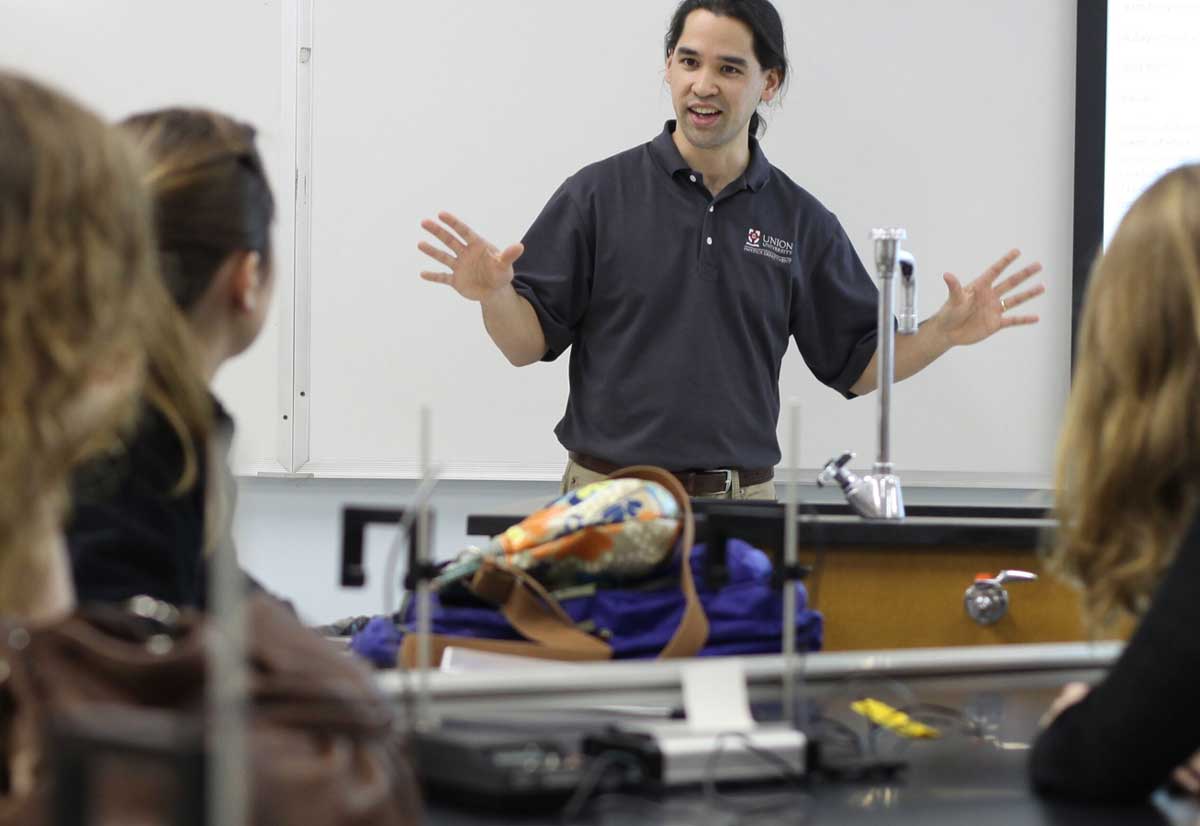Academic Program
Physics is a practical discipline. Physics aids aircraft designers, allows MRI imagers to peer inside a body, assists meteorologists in weather prediction, and affords computer scientists the abilities to design powerful computers. Physics forms the foundation for engineering and is vital to non-physics disciplines like medicine, archaeology, environmental studies, and even economics and music.
As part of Union University's Physics Program, you will master an excellent physics curriculum. You will also become one of society's problem-solvers, an effective communicator, and a creative thinker. As a liberal-arts institution, Union University educates the whole person, so you will become conversant in such areas as business, social sciences, humanities, and theology. You will enjoy small classes and personal assistance as you pursue a physics degree. Whether you desire a career in research, teaching, industry, or government, Union will get you there.
Programs of Study
The Department of Physics offers the Bachelor of Science degree with one major and also offers a minor in Physics.
The major in Physics may be completed with Discipline-Specific Honors. 2024-25 Catalogue: Major in Physics 2024-25 Catalogue: Teacher Licensure in Physics (Grades 6-12)
Major in Physics
Featured Courses
Minor in Physics
Featured Courses
Salary Expectations
According to the American Institute of Physics, you'll earn a starting salary between $46,000 and $58,000 in industry once you obtain a B.S. degree in physics. The median salary for physicists with BS degrees (average age 47) is $72,000. And about half of the nation's physics graduates continue their education in graduate school. Medical physicists with Ph.D.s working in hospitals have a median salary of $135,000.

Preparation for the Curriculum
The physics degree is a rigorous curriculum that requires advanced mathematics skills. As an incoming physics major, you will generally begin your math education with calculus, so you should have completed math up through trigonometry by the time you graduate from high school. Your courses will relate to each other in a logical, progressive manner and will increase in mathematical complexity as you advance. The Department of Physics designs the curriculum so that students who have obtained the baccalaureate degree will be competitive to enter the graduate or professional program of their choice or be successfully employed in industry.
In general you should plan to complete your curriculum in four years. As an incoming physics major, you will be assigned a physics advisor who will prepare a detailed schedule of courses for you. We view physics advising as more than course scheduling, and you can expect your advisor to serve as a mentor as you plan your future education and profession. Below is a synopsis of what you should expect as you begin the physics curriculum at Union University.
Sample Schedule for Physics Major
Freshman Year
| Fall | Spring |
|---|---|
| BIO 112 - Principles of Biology (4 hrs) CHR 111 - Old Testament Survey (3 hrs) ENG 111 - Written Composition I (3 hrs) MAT 211 - Calc. and Analytical Geometry I (4 hrs) CLU 195 - College Life at Union (2 hrs) TOTAL HOURS - 16 |
PHY 231 - University Physics with Calculus I (5 hrs) CHR 112 - New Testament Survey (3 hrs) ENG 112 - Written Composition II (3 hrs) MAT 212 - Calc. and Analytical Geometry II (4 hrs) PEWS 100 - Fitness for Health (1 hr) TOTAL HOURS - 16 |
Sophomore Year
| Fall | Spring |
|---|---|
| CHE 111 - General Chemistry I (4 hrs) ENG 201 - World Literature I (3 hrs) MAT 213 - Calc. and Analytical Geometry III (4 hrs) PHY 232 - University Physics with Calculus II (5 hrs) PEWS - Physical Activity Elective (1 hr) TOTAL HOURS - 17 |
CHE 112 - General Chemistry II (4 hrs) ENG 202 - World Literature (3 hrs) MAT 314 - Differential Equations (3 hrs) PHY 311 - University Physics: Modern Physics (4 hrs) CSC 111 - Computer Science I (3 hrs) TOTAL HOURS - 17 |
Junior Year
| Fall | Spring |
|---|---|
| PHY 317 - Introductory Electronics (4 hrs) HIS 101 - World Civ. to the 18th Century (3 hrs) PHY 313 - Intermediate Mechanics (3 hrs) PHY 325 - Thermodynamics and Stat. Mech. (3 hrs) ART 210 - The Arts in Western Civilization (3 hrs) TOTAL HOURS - 16 |
COM 112 - Public Communication (3 hrs) HIS 102 - World Civ. to Present (3 hrs) PHY 314 - Intermediate Electricity and Magn. (3 hrs) PHY 420 - Quantum Mechanics (3 hrs) Electives (6 hrs) TOTAL HOURS - 18 |
Senior Year
| Fall | Spring |
|---|---|
| PHY 430 - Experimental Physics Laboratory (3 hrs) ECF 211 - Principles of Macroeconomics (3 hrs) PHY 395 - Special Studies in Physics (3 hrs) Electives (6 hrs) TOTAL HOURS - 15 |
PHY 424 - Physics Research (1-3 hrs) ECF 212 - Principles of Microeconomics (3 hrs) PHY 495 - Independent Study (1 hr) PHY 498 - Physics Seminar (1-3 hrs) Electives (6-10 hrs) TOTAL HOURS - 16 |

